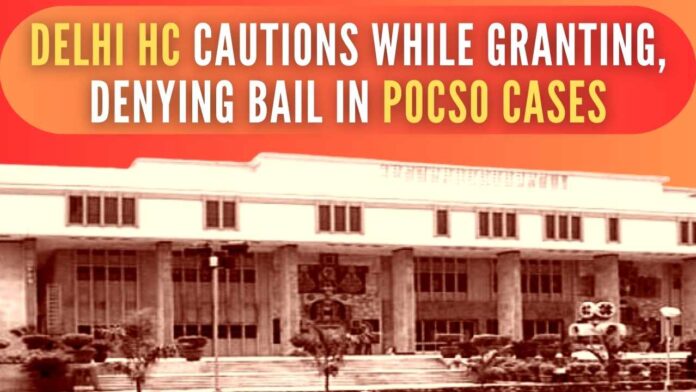
Delhi HC in POCSO case says ‘adolescent love can’t be controlled by courts’, grants bail to boy accused of raping minor
Since “adolescent love” cannot be regulated by the courts, judges must be careful when deciding whether to deny or grant bail in POCSO cases, the Delhi High Court has said.
The observation of Justice Sawarana Kanta Sharma comes after judge Jasmeet Singh of the same court recently said that the Protection of Children from Sexual Offences (POCSO) Act’s issue of criminalization of “adolescent love” has to be addressed.
Justice Sharma observed that teens who “try to imitate the romantic culture of films and novels” are ignorant of the law and age of consent.
She said: “This court also observes that the attitude towards early love relationships, especially adolescent love, has to be scrutinized in the backdrop of their real-life situations to understand their actions in a given situation.”
The court observed as it considered a 19-year-old boy’s plea for bail in connection with an FIR filed by the girl’s family under Sections 363 and 376 of the Indian Penal Code and Section 6 of the POCSO Act.
Justice Singh, had, however, said it while speaking as a Chief Guest in a seminar by the Delhi Commission for Protection of Child Rights on “Rehabilitation of POCSO victims: Strategies, Challenges, and Way Forward”.
Justice Sharma stated during the hearing that incarceration in such circumstances will create distress and have an adverse effect on the accused’s psychological health since innocent teenage boys and girls languish in jail or protection homes in cases of teenage love.
The girl was discovered to be seven weeks pregnant during the investigation, and the pregnancy was medically terminated. The boy was the child’s biological father, according to the DNA report.
Although her academic record did not corroborate her claim, the girl, who was also heard in this case, testified in court that she was 18 years old at the time of the occurrence.
In granting the boy relief, the court noted that the girl had repeatedly claimed in her statement pursuant to Sections 161 and 164 of the Criminal Procedure Code and in the testimony that was recorded in court that she had gone with the boy of her own free will after growing fond of him.
Observing that the court cannot go into the question as to whether the girl was 16 or 18 years of age at the time of the incident, Justice Sharma said:
“This court notes that the prosecutrix has been consistent in her statement under Section 161 and 164 Cr.P.C. as well as before the Court and supports the man she loves, blissfully unaware that the law in this country does not support such love stories. The main character i.e., the present accused is not a criminal, but was merely in love and at the instance of her lady love, being unaware of the nitty-gritty of law, had taken her to a place which was 2200 kms. away from Delhi to lead a peaceful life.”
Because neither the boy nor the girl had turned off their mobile phones to prevent the police or the family from knowing where they were, the court noted that there was absolutely no evidence of any criminal intent.
The court said: “Though, the entire story reads like the story of a romantic novel or a film about teenage love, in real life, this court notes that it had two main characters in their teens who loved each other, supported each other, and somehow wanted their relationship in marriage to be validated, and for that, the only idea that came to the mind of the prosecutrix was giving birth to a child from their union,” the court said.
It added that though consent of a minor may be of no value in the eyes of the law, in the peculiar circumstances and facts of the case, it will not be prudent for a court to label the boy as an accused when there was no incriminating evidence against him on record.
“Therefore, this Court repeats that it is not laying down any law, but only notes with caution that in cases such as the present one, the courts are not dealing with the criminals, but with two teenage individuals who wanted to live their life as they deemed fit being in love. The love of course did not understand or knew the bar of age of consent as the lovers only knew that they have the right to love and lead life as they thought fit for themselves,” the court said.
The court granted the boy bail for a period of two months beginning on the day of his release, noting that the girl and boy’s wedding is slated to take place at the end of this month.
“This court, as a note of caution while granting bail in this case and making the above observations, clarifies that every case of such nature has to be adjudged on its own peculiar facts and circumstances, and the age being in the shadow of doubt as well as the consistency in the statement of the prosecutrix and lack of inducement or threat in such cases has to be adjudicated on facts and circumstances of each case,” the court clarified.
[With Inputs from IANS]
PGurus is now on Telegram. Click here to join our channel and stay updated with all the latest news and views
For all the latest updates, download PGurus App.
- PM Modi launches another scathing attack on Congress; says ‘Rajiv Gandhi scrapped inheritance law to save family property’ - April 25, 2024
- TN: ED questions five district collectors in illegal sand mining case - April 25, 2024
- ECI issues show cause notice over alleged MCC violations by PM Modi, Rahul Gandhi; seeks response from BJP, Congress chief - April 25, 2024











Trash the constitution for its low level rules. Rapist should get punishment within ONE month and the only way justice is achieved by castration. Think no more on this. Rape is such a humiliation on the victim, she has to live with it for rest of the life.